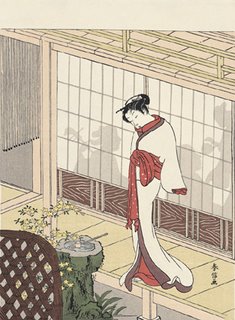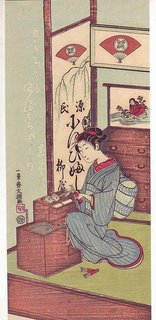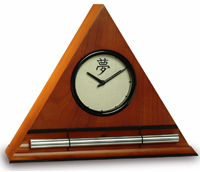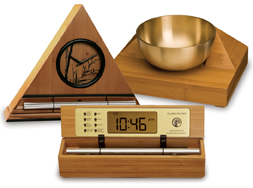
harunobu suzuki, Beauty at the Veranda
For most women who chronically bump along on near empty, it’s no mystery that getting to bed a little earlier would help. “The sleep system really does work like a bank,” says William Dement, MD, PhD, who—as chief of the sleep medicine division at the Stanford University School of Medicine—should know. “We can keep going for a long time on borrowed energy because our survival mechanisms kick in. At some point, however, every hour lost needs to be paid back.” But instead of the pillow, we’ll often reach for coffee—37 percent of American women chug more than three caffeinated beverages a day, according to the National Sleep Foundation—or a glass of wine, or something sweet, or the remote control to “wind down” with Anderson Cooper, who’s inevitably reporting from a war zone with things blowing up in the background. None of these efforts restores energy—some, in fact, do the opposite. Even when you do finally climb into bed, there are times when anxiety invades your sleep, leaving you bleary-eyed and dragging day after day. So we decided to investigate what—short of permanent residency at a spa—gives you a real rest.
Paradoxically, according to the newest research, when you’re looking for a profound rest cure, rather than trying to tune out, you may be better off tuning
in and anchoring your awareness in the present moment. You can approach such engagement through various routes, like fully using your senses, practicing mindfulness, getting into a flow state, and—most difficult for many, but perhaps most effective—giving up the need to be in control.

tune in
Loch Kelly, A New York Buddhist-trained psychotherapist and meditation teacher, uses a technique called “resting in the heart space” to help people relinquish the reins; in his experience it provides the deepest rest in the shortest amount of time. “Traditionally, meditation focuses on getting to a state so neutral that there isn’t a problem to solve. Some monks spend 20 years in isolation working on just that.” But anyone, Kelly claims, can attain a sense of flow—and many of us already do through ordinary activities like gardening, knitting, working, or driving. When you’re in a car, for example, you have to focus on the road as it looks in the moment and, at the same time, stay alert to continually anticipate the next move. Eventually, your brain resolves the two directions it’s working in by falling into a rhythm, which leads to an open state of awareness that Kelly calls flow. You’re most likely to feel it after an unfettered drive in the country—no urgent sense of time passing or future demands impinging, but rather a merging into the current, a harmony with the environment as the present unfolds. “There’s something that’s unhooked from the mind, prior to thought, and at the same time intelligent,” Kelly says. “You can respond quickly.” Entering this flow state signals the brain that you’re safe, not in danger mode.
Once you’ve gotten a sense of what flow is, you’re ready for the heart space meditation. Kelly suggests deciding ahead of time how long you can allow yourself to rest—people usually do it from one to 20 minutes, but you may want to go longer. To prepare, take a big inhalation, filling your stomach from the bottom to the top like a water pitcher. Exhale as you normally would. Next, look up and gradually allow your peripheral vision to expand, a gesture intended to keep you engaged with your surroundings. Smile to tell yourself that you’re doing something you enjoy.

get the rest you need
Boulder, Colorado—an innovative company has taken one of life’s most unpleasant experiences (being startled awake by your alarm clock early Monday morning), and transformed it into something to actually look forward to. “The Zen Alarm Clock,” uses soothing acoustic chimes that awaken users gently and gradually, making waking up a real pleasure. Rather than an artificial recorded sound played through a speaker, the Zen Clock features an alloy chime bar similar to a wind chime. When the clock’s alarm is triggered, its chime produces a long-resonating, beautiful acoustic tone reminiscent of a temple gong. Then, as the ring tone gradually fades away, the clock remains silent until it automatically strikes again three minutes later. The frequency of the chime strikes gradually increase over ten-minutes, eventually striking every five seconds, so they are guaranteed to wake up even the heaviest sleeper. This gentle, ten-minute “progressive awakening” leaves users feeling less groggy, and even helps with dream recall.
By Sara Reistad-Long
O, The Oprah Magazine

Now & Zen's Family of Alarm Clocks
Now & Zen’s Chime Alarm Clock Shop
1638 Pearl Street
Boulder, CO 80302
(800) 779-6383
Posted in Bamboo Chime Clocks, Chime Alarm Clocks, Natural Awakening, sleep, Sleep Habits